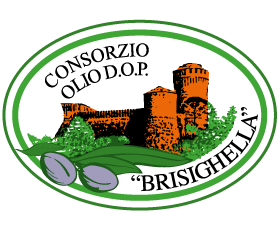
Consortium PDO oil Brisighella
Via Tebano, 45 – 48018 Faenza, RA
C.F.: 01358680393
Phone 0546 81103
Fax 0546 81497
info@brisighelladop.it
To obtain the select Brisighella PDO oil, the olives are processed using a procedure called milling, which is divided into five stages.
Leaf removal and washing
Leaf removal is the first step in the milling process.
The leaves, stems and dirt are removed using an automatic suction machine.
The leafless olives are then washed in cold water to clean them and prepare them for the crushing stage.
Crushing
Crushing is a mechanical operation where the olives are ground.
Once the flesh is crushed, droplets of oil come out of the fruit and mix with the solid and liquid components of the crushed mass, forming olive paste.
Malaxation
This process lasts no more than 60 minutes and is used to allow the micro-droplets of oil present in the paste to combine through continuous churning at a temperature between 20°C and 27°C.
Extraction and separation
The olive paste obtained after malaxation is first sent to a horizontal centrifuge called a decanter that extracts the oil from the paste and separates it from the vegetal water and pomace, or the remaining solid part of the paste.
The result is an oil with a very rustic flavour called ‘Fruttato Selvaggio’ (Wild Fruity), which may become Intense, Medium or Light Fruity over time, depending on the cultivar.
The water and pomace produced during this stage are not discarded but continue on their way to be processed further.
Storage and bottling
The oil is finally stored in stainless steel containers in a cool, dry place.
The final stage in this process is the packaging, where blowers, spout fillers, double-sided labellers and cappers are used to prepare the oil for sale.
To obtain the select Brisighella PDO oil, the olives are processed using a procedure called milling, which is divided into five stages.
Leaf removal and washing
Leaf removal is the first step in the milling process.
The leaves, stems and dirt are removed using an automatic suction machine.
The leafless olives are then washed in cold water to clean them and prepare them for the crushing stage.
Crushing
Crushing is a mechanical operation where the olives are ground.
Once the flesh is crushed, droplets of oil come out of the fruit and mix with the solid and liquid components of the crushed mass, forming olive paste.
Malaxation
This process lasts no more than 60 minutes and is used to allow the micro-droplets of oil present in the paste to combine through continuous churning at a temperature between 20°C and 27°C.
Extraction and separation
The olive paste obtained after malaxation is first sent to a horizontal centrifuge called a decanter that extracts the oil from the paste and separates it from the vegetal water and pomace, or the remaining solid part of the paste.
The result is an oil with a very rustic flavour called ‘Fruttato Selvaggio’ (Wild Fruity), which may become Intense, Medium or Light Fruity over time, depending on the cultivar.
The water and pomace produced during this stage are not discarded but continue on their way to be processed further.
Storage and bottling
The oil is finally stored in stainless steel containers in a cool, dry place.
The final stage in this process is the packaging, where blowers, spout fillers, double-sided labellers and cappers are used to prepare the oil for sale.